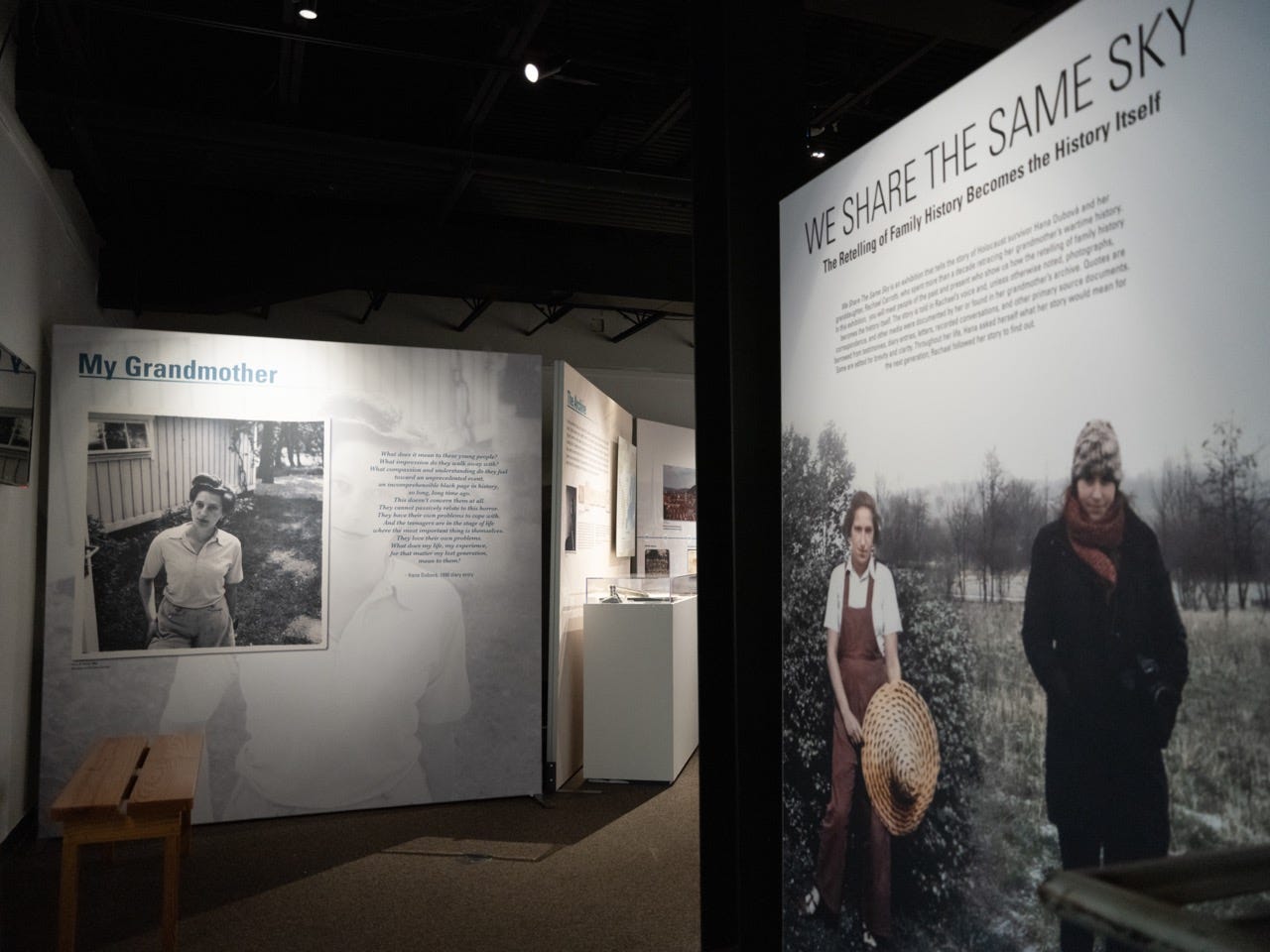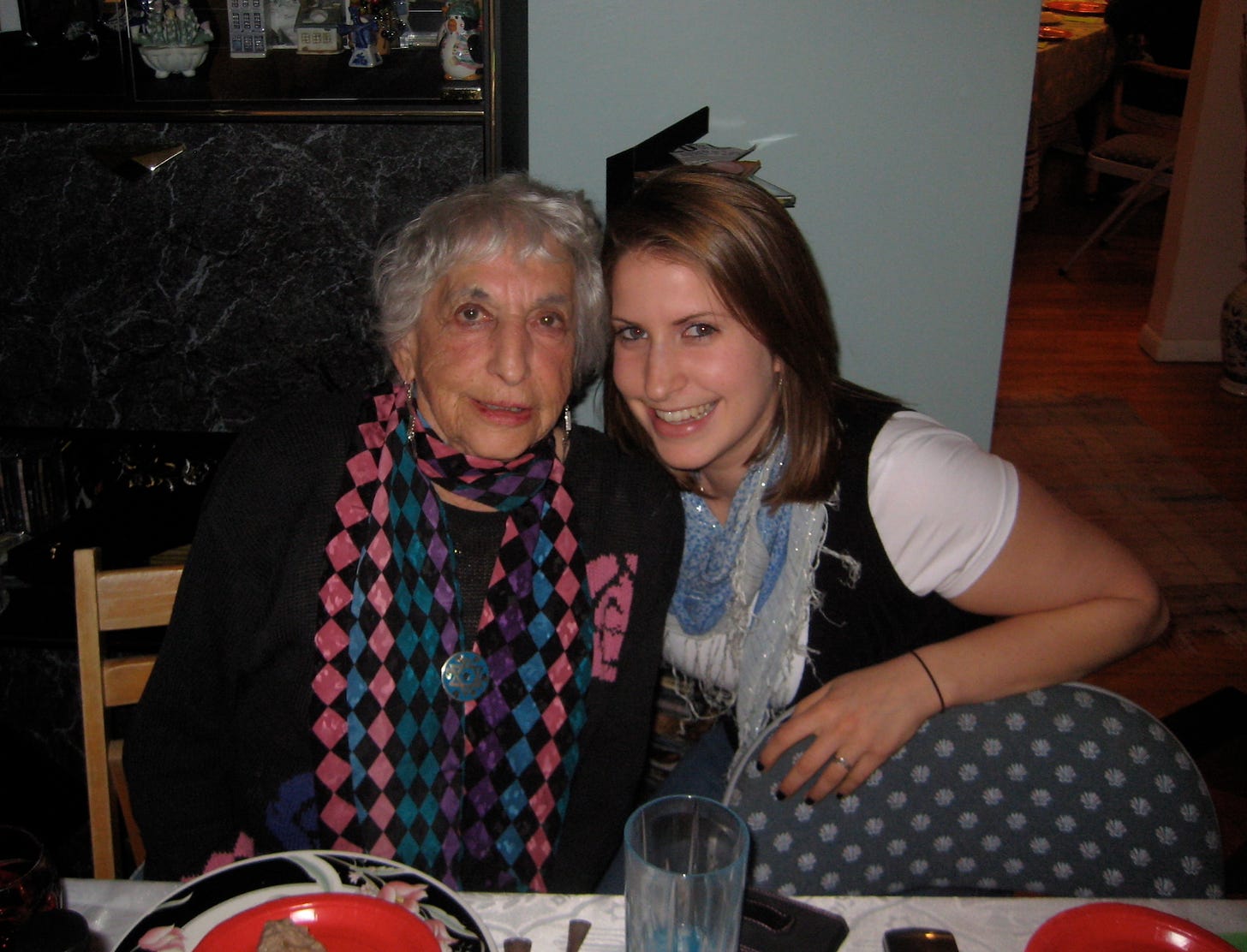Below is an open letter to the students I met at Amherst College during a campus visit to commemorate Holocaust Remembrance Day.
Dear Students,
A few weeks ago, your campus rabbi reached out to ask if I’d join you for Holocaust Remembrance Day. She said to me, “Everything is so difficult right now, but it feels like more than ever we need to commemorate this day. But how?”
Before October 7th, there was already a robust conversation regarding Holocaust education. For years, many of us educators have been resistant to some of the traditional curriculums that focus on death camps and atrocities. There has been a growing focus on rescue missions, upstanders, and survival after the war. There has been a recognition that education through fear of human behavior can’t be the goal. In my opinion, education through empowerment is where we need to focus. History can be a blueprint for morality, helping us better understand how to progress towards peace in times when prejudice prevails.
Being part of this conversation, and staying creative and contemporary with how I tell my own grandmother’s story, has always been a driving force for me. In the 15 years since I began working on We Share The Same Sky, I’ve felt this history go from linear, to circular, to a dizzying spiral. And I’ve gone from inspired to engaged to burned out—like, really burned out. But then onwards to contemplative, and now energized. I’m inspired by the evolving relevance of history (a term gifted to me by my friend Julie Lindahl who spent years studying her family’s Nazi past); as current events unfold we must reexamine our own life experiences and family histories and see them through new lenses.

In the wake of October 7th though, I went quiet. Not passive, but quiet. It’s important not to confuse the two. I’ve slowly been getting back to my public events, and your campus is the first I’ve visited in a long while. The morning of my visit, I was particularly sensitive to the headlines. There are large-scale protests on college campuses across the country calling for military divestment from Israel, a cease-fire in Gaza, and the right to self-determination for the Palestinian people. My emotional state has been vacillating dramatically as I watch the news. I hold deep pain and fear for your peers who are trying to peacefully protest and are being met with police brutality and censorship. And I’m carrying deep pain and fear for myself and my Jewish friends and family who are watching from afar and reliving a traumatized history. We are triggered by the aggressive antisemitism that has been inflicted by the outliers amidst those protestors. In the same erratic breath, I fear for both; I fear for all.
But, on this Wednesday night together at Amherst College, we sat in a peaceful room filled with sprawling plants and big windows that looked out to the quintessential college campus scene. It was the most cozy; I had my shoes kicked off and was surrounded by all of you—a group of engaged students and a few professors who wanted to commemorate the history of the Holocaust together. In the hour we shared, you gave me your full attention as I talked about my grandmother’s life and why it matters to me. And I thought about the words one of my friends and mentors, Stephen Smith, has told me about telling any story: “Go there.” I was “here” — on your college campus — and it felt so good.
I think about you young people all the time and my heart aches for you. You’ve endured so much in your adolescence, granting you a wisdom about this current moment that none of us already-grown adults can understand. Your high school years were stolen by Covid and the repetitive news of school shootings. You have learned about yourselves through the mirror of social media, which can connect us to one another while simultaneously leaving us feeling lonely, insecure, and scared. You are acutely aware of climate change and the insane debt you are forced to take on just so we could sit together in a light-filled room. And now, your college years are being narrated by the story that we are encroaching on World War III or Civil War (or both). I imagine “hope” feels hard. It certainly does for me. And, I imagine despair is easy. It certainly is for me.
I’ve always felt like it’s you, the young people, who will save us. You have to. And I can’t think of a better way of helping you help the rest of us than to sit in community and conversation together. To really listen to your questions. And to really interrogate why you are asking those questions. And then, hopefully, to have the chance to ask some in return. When we began our conversation to commemorate Holocaust Remembrance Day, I told you that this is a conversation we need to have together. That *we* have to participate in the question of how and why to remember this time period that we weren’t witness to ourselves. *We* have to share the answer to what feels grounding, helpful and instructive right now. You have to help us educators understand what’s relevant today.
I hope that’s not too much pressure. From what I experienced you already have ideas on how to do that. Now it’s just on us, the ones older than you, to listen.
In friendship,
Rachael
“What does it mean to these young people? What impression do they walk away with? What compassion and understanding do they feel toward an unprecedented event, an incomprehensible black page in history, so long long time ago?… What does my life, my experience for that matter, my lost generation mean to them?” - Holocaust Survivor Hana Dubová (my grandmother)

This past February, I received The Legacy Award from The Florida Holocaust Museum for the work I’ve done in Holocaust storytelling. It was really powerful to recognize that I’m at an age and stage of life where I would receive an honor that was about the culmination of my work and not just a specific project. To commemorate Yom HaShoah (Holocaust Remembrance Day), I’d like to share a piece of the thank you speech I gave when I received the award.
When my grandmother, Hana, who we all called Mutti, recorded her testimony with USC Shoah Foundation in 1998, she was asked by the interviewer why she chose to leave her story behind. She responded by saying, you know, when I look through my photo albums, I realize that nobody will know who these people are or what their lives were like. So, at least the next generation will have that. And if they are interested, I did it. And if they are not interested, I won’t know.
Well, Mutti, I was interested. Very much so.
So, here’s a little bit of what I’ve learned from my grandmother and others.
Yes - we should remember our victimhood. We should be prepared for what bad may come. Who and what we may lose. We should witness the warning signs of authoritarianism and take to democracy when a wanna-be-dictator is making a successful grab for power. We must learn from that. We must act from that. We must remain alert to the stories that haunt us - the ones from the past and the present. Like my grandmother once said, we didn’t go like sheep to slaughter, but nobody wanted us.
In the story she left behind, she lost her whole family but she was saved, because someone did want her. People who came from different languages, religions, and cultures cared. In her story she was saved by strangers. By unsung heroes. By bystanders turned rescuers. And sometimes those people literally saved her physical life—like the unnamed boat captain who took her from Denmark to Sweden in 1943 when she had absolutely no money to give. But more often in her story, it was small acts of kindness that strangers bestowed upon her that saved her spirit and ultimately her life.
So let’s not forget how much more we learn from our past generations than just what to fear. We learn how to live with hope and perseverance. We learn how to thrive even in discomfort. We learn how to fall in love and how to make our way through heartbreak. We learn how to say goodbye to what once was and adapt to what is. We learn about the healing process. And recovery of the soul.
We learn from survivors that sometimes we need to yell at the top of our lungs and exhaust ourselves as we urgently run towards the arc of justice. We also learn that it can be just as valuable to sometimes stay quiet, breathe deep, to listen, and create the space to pay attention and be patient.
We also learn that we must keep an evolving relationship with the stories of our past. We must always be open to letting a memory take a different shape, to feel different. Because everything we learn and experience—whether it is at the museum or at a family dinner table—is a story in motion…

Stories for Holocaust Remembrance Day:
If you would like to hear from a Holocaust survivor or their descendants on this Holocaust Remembrance Day, here are some episodes of the ALONG THE SEAM podcast to listen to.
Betty Grebenschikoff - Betty z’’l was a survivor from Germany. Listen to her story about being reunited with her childhood best friend 80 years after they said goodbye.
Elizabeth Rosner - Elizabeth is the author of Survivor Café: The Legacy of Trauma and the Labyrinth of Memory. She is the daughter of two Holocaust survivors.
Morris Price (told via an episode with Juan Zambrano) - Listen to a story about how an Uber ride with a Holocaust survivor changed the driver’s life.
Elana Israel - Elana is my cousin and in this episode I ask her how she feels about all the years I’ve spent retelling our grandmother’s story.
Ariel Burger - Ariel is the author of Witness: Lessons from Elie Wiesel’s Classroom and was a lifelong friend and student to the Holocaust survivor and Nobel Peace Prize Winner, Elie Wiesel z’’l.


